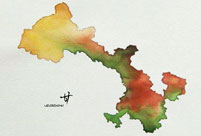 Avant-garde approach to graduation photos
Avant-garde approach to graduation photos
 Early PLA posters, signatures of an era
Early PLA posters, signatures of an era
 First Russian Street in Tianjin open to public
First Russian Street in Tianjin open to public
 Motorcycle stunt on the Bund
Motorcycle stunt on the Bund
 French Spiderman Alain Robert climbs up Galaxy Hotel in Macao
French Spiderman Alain Robert climbs up Galaxy Hotel in Macao
 Africans in Guangzhou
Africans in Guangzhou
 Pole dancer shows strength and beauty up in the air
Pole dancer shows strength and beauty up in the air
 College girls call for protection of ecological space on earth
College girls call for protection of ecological space on earth
 Top 10 celebrities driving auto brands
Top 10 celebrities driving auto brands
 10 low-carbon tips to save money
10 low-carbon tips to save money
SHIJIAZHUANG, May 3 -- Excavations of a Neolithic site dating back more than 5,000 years in north China shows cultural interaction among migrating populations in ancient China, said Chinese archaeologists.
The site in Rongcheng County, Hebei Province, covers an area of 1,700 square meters. Thousands of pieces of pottery have been unearthed with red the most common, said Xu Haifeng, a researcher with the Hebei Cultural Heritage Research Institute, on Saturday. The excavated items showed double-ear or tube-shaped pots were popular tools.
The cooking equipment was advanced as a "Zeng", or an earthen vessel for steaming food, already existed at that time, said Xu, adding all these revealed the life of ancient people.
The site was the forefront of north-south cultural and people exchanges, said Zhang Xiaozheng, head of the excavation team.
"We can imagine a branch of people from current Inner Mongolia and Liaoning Province moved southward with red pottery skills while another moved northward from current Henan Province with relatively advanced colored pottery," said Zhang.
They met in the area of the relic site, added Zhang.
The excavation of the site is still underway.
 The Western Qing Mausoleum
The Western Qing Mausoleum Overseas returnees strive for dreams in Beijing
Overseas returnees strive for dreams in Beijing Fried up: Chili pork bonanza in Central China
Fried up: Chili pork bonanza in Central China Hand-painted maps go viral online
Hand-painted maps go viral online 4th Beijing Int'l Film Festival ends
4th Beijing Int'l Film Festival ends Commando elite specializes in sign language
Commando elite specializes in sign language Man photoshops himself into girlfriend's childhood photos
Man photoshops himself into girlfriend's childhood photos Photo story: Stallholders at Beijing Zoo Wholesale Market
Photo story: Stallholders at Beijing Zoo Wholesale Market Artists on backstage
Artists on backstage 'African Street' in Guangzhou
'African Street' in Guangzhou Special operation members in comprehensive training
Special operation members in comprehensive training Cute Shaolin boy melts the hearts of millions
Cute Shaolin boy melts the hearts of millions Giant panda Sijia is back to happy life
Giant panda Sijia is back to happy life Richest Chinese of 2014: half from the mainland
Richest Chinese of 2014: half from the mainland Chengdu - laid-back lifestyle makes happiest city
Chengdu - laid-back lifestyle makes happiest cityDay|Week|Month